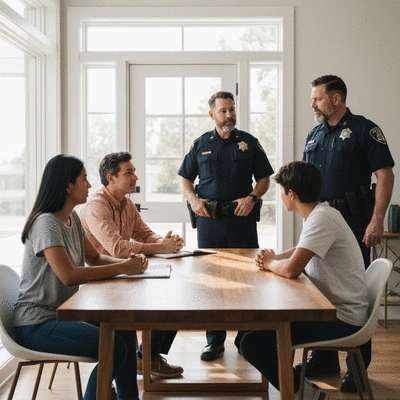Understanding your rights when faced with police at your home is crucial for safeguarding yourself and your family. Many people are unsure of how to respond in these situations, but knowledge is power. Here are the key takeaways from the article that can help empower you during unexpected encounters with law enforcement.
What You Will Learn
- The Fourth Amendment generally requires police to obtain a warrant before entering your home.
- Exceptions to the warrant requirement include consent, emergencies, and exigent circumstances.
- Children cannot legally consent to police entry unless deemed mature enough by a court.
- Police officers must identify themselves and explain the purpose of their visit upon arrival.
- Being informed of your rights can help you advocate effectively for yourself and your family during police encounters.
Key Legal Conditions for Police Entry into Your Home
The Fourth Amendment protects against unreasonable searches and seizures, but certain conditions permit police entry without a warrant. Understanding these exceptions is vital.
Warrant Required
Generally, police need a warrant to enter your home, backed by probable cause and judicial approval.
Exception 1: Consent
Voluntary permission from an occupant allows police entry without a warrant.
Exception 2: Emergencies
Immediate danger (e.g., fire, crime in progress) permits warrantless entry.
Exception 3: Exigent Circumstances
Situations preventing evidence destruction or offender escape allow entry.
Important: Children Cannot Consent
Generally, children lack the legal capacity to consent to police entry.
Understanding Your Rights When Police Arrive
When it comes to police entering your home, understanding your rights is crucial. The Fourth Amendment of the United States Constitution protects you against unreasonable searches and seizures. This means that, generally, police need a warrant to enter your home. However, there are exceptions, and knowing these can help you during unexpected encounters with law enforcement.

Many people feel uncertain about how to respond when police arrive at their door. It’s important to empower yourself with knowledge about your rights and the legal framework surrounding them. Let’s dive into the specifics!
Legal Framework: The Fourth Amendment Explained
The Fourth Amendment plays a vital role in safeguarding our privacy. It essentially states that law enforcement must have probable cause and obtain a warrant to conduct a search. This constitutional protection is pivotal in ensuring that your home remains a safe haven unless there are compelling reasons to allow entry.
- Warrant Requirement: Police typically must obtain a warrant before entering your home.
- Expectation of Privacy: You have a reasonable expectation of privacy in your home.
- Legal Precedents: Numerous court cases have reinforced the importance of the Fourth Amendment.
Understanding these elements can help you articulate your rights clearly when faced with a police encounter. As a journalist and tech enthusiast, I often emphasize the importance of being informed, especially in situations where your rights may be at stake.
Warrantless Entry: When Can Police Legally Enter Your Home?
While the Fourth Amendment protects against unwarranted entry, there are specific circumstances where police can enter without a warrant:
- Consent: If you or someone else in the home gives consent willingly, police can enter.
- Emergencies: In cases of immediate danger, such as a fire or a crime in progress, police may enter without a warrant.
- Exigent Circumstances: This includes situations where evidence may be destroyed or an offender may escape.
It’s vital to know these scenarios because they can affect how you respond if the police arrive at your home. As I reflect on my experiences reporting on such matters, I see how understanding the legal landscape can empower individuals in challenging situations, particularly when considering programs like the Governor's Office of Crime Prevention, Youth, and Victim Services, which aim to clarify legal processes.
The Role of Police Authority in Home Entry Situations
The authority of police during home visits is bound by law but can sometimes be misunderstood. Police officers must identify themselves and explain the reason for their presence. They also have a duty to respect your rights while conducting their investigations.
- Identification: Officers should always provide proper identification and state their purpose.
- Respect for Rights: Even in exigent circumstances, they must operate within the legal framework.
- Limits of Authority: Police cannot force entry unless certain conditions are met.
Understanding these points is essential for maintaining your rights and ensuring that any interaction with law enforcement respects your legal protections. Just as I strive to deliver transparency in reporting, it's crucial for you to have clarity in these moments. This understanding is also critical in discussions about community security programs and how they interface with individual rights.
Pro Tip
Did you know? It's beneficial to keep a recorded copy of your rights and responsibilities regarding police interactions at home. Consider printing out a concise guide and placing it in a visible location, like your refrigerator. This way, family members, including children, can quickly refer to it, ensuring everyone knows how to respond calmly and confidently in unexpected situations.
Frequently Asked Questions About Police Entry Into Your Home
Do police always need a warrant to enter my home?
No, while the Fourth Amendment generally requires a warrant, there are exceptions such as voluntary consent, emergencies (like a fire or crime in progress), and exigent circumstances (to prevent evidence destruction or an offender's escape).
Can my child give consent for police to enter my home?
Generally, no. Children typically lack the legal capacity to give valid consent for police entry. A court may deem a child mature enough in rare cases, but it's not the usual practice.
What should I do if police arrive at my door without a warrant?
You have the right to ask them to state their purpose and to ask if they have a warrant. If they do not have a warrant and no emergency or exigent circumstances exist, you are not obligated to let them in. You can also state that you do not consent to a search.
What are "exigent circumstances"?
Exigent circumstances are situations that require immediate action to prevent serious harm, such as the destruction of evidence, the escape of a suspect, or a threat to someone's safety. In these cases, police may be allowed to enter without a warrant.
Should I educate my family about these rights?
Yes, it is highly recommended to discuss these rights with your family, including children, so everyone understands how to respond calmly and effectively during an unexpected encounter with law enforcement.
Summarizing Your Rights and Responsibilities
Understanding your rights when police arrive at your home, especially with children present, is crucial for ensuring your family's safety and well-being. Here are the key points to keep in mind:
- The Fourth Amendment protects you against unreasonable searches and seizures, meaning police generally need a warrant to enter your home.
- There are exceptions to this rule, such as consent, emergencies, or when they have probable cause.
- Children do not possess the legal capacity to consent to police entry on their own unless they are of an age deemed mature enough by the court.
- If a child refuses entry, it can lead to complex scenarios that may require police to evaluate the situation carefully.
As we’ve discussed, these rights and responsibilities shape how families can navigate interactions with law enforcement. Being informed means you can advocate for your family effectively!

Taking Action: What Should You Do Next?
Now that you have a clearer understanding of your rights, it’s time to take action! I encourage you to educate your family about these legal rights and prepare them for various scenarios that might arise. Here are some practical steps to consider:
- Hold family discussions about what to do if police arrive at your home.
- Teach children about their rights and the importance of not opening the door without permission.
- Create a plan that helps children feel safe and knows how to handle unexpected visits from law enforcement.
Remember, this knowledge is empowering! Also, consider consulting with a legal professional for personalized advice on home safety and child protection. It’s always better to be prepared and informed, ensuring your family’s rights are protected in any situation. Don’t hesitate to reach out with questions or share your experiences in the comments below! Let’s work together to build a community of informed parents and advocates!
Recap of Key Points
Here is a quick recap of the important points discussed in the article:
- The Fourth Amendment protects against unreasonable searches and seizures, requiring a warrant for police to enter your home.
- Exceptions to the warrant requirement include consent, emergencies, and exigent circumstances.
- Police must identify themselves and respect your rights during home visits.
- Children cannot consent to police entry unless deemed mature enough by a court.
- Educating your family about their rights is essential for safety during police encounters.






